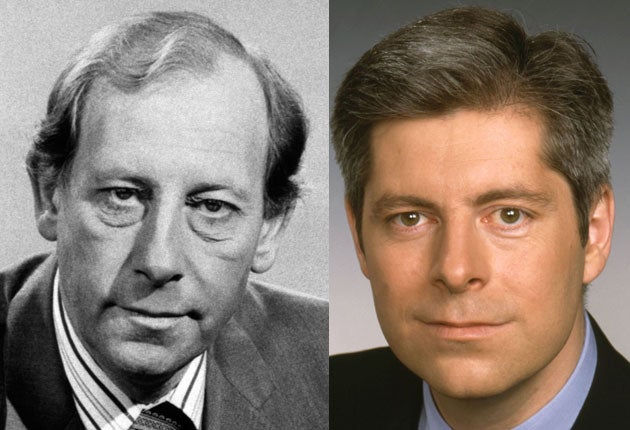Here is the news: Radio 4 presenter is love child of a 1960s BBC anchorman

It takes a lot to shock John Humphrys. But when Justin Webb, his co-host on the Today programme, revealed that he was the secret love child of the Welshman's old BBC colleague, the newsreader Peter Woods, even Humphrys was taken aback.
Webb, who turned 50 this month, chose to make the revelation in a heartfelt article published today in the Radio Times. He said: "I have realised recently that my aim to keep quiet for ever has been naive. I need to be able to let my own young children know who their grandfather was".
He says that Woods, who died in 1995, visited him and his mother only once, when he was six months old. "Emotionally and physically, he was absent. He had a life and a family of which I was no part. He never had any further contact with my mother, or with me." But he also paid tribute to his father as "discreetly charming, baggy-eyed and lived-in looking, serious yet warm".
Webb's mother, Gloria Crocombe, met Woods when the pair worked together at the Daily Mirror. "He was a star reporter and she was the newsroom secretary, bright and articulate and herself from a journalistic family: her father was the first editor of Radio Times. Incredibly, when she told the Mirror that she was pregnant they sacked her. I have often thought of her going home on the bus after her last day, alone and without means of support."
Webb was brought up in the New Forest and sent to boarding school. He knew who his father was. "I used to watch the news and see him, but not really make much of a connection between him and me. I acknowledge this is odd, but there it is," he writes. He never approached Woods – out of respect for his mother – even after he followed his footsteps and joined the BBC. "He was by then retired but very much alive, and I can honestly say that I never thought of making contact. I built my career without consciously aping his, without giving him much of a thought."
Webb paints a poignant picture of growing up as an only child. "The marriage and the household were not happy ones. My stepfather never became a father figure. I had no brothers and sisters. My life was rescued by my mother's unswerving love."
Having established himself as one of the BBC's best-known journalists, Webb found himself in awkward situations when his father's name was mentioned in conversation. "At dinner with the former Labour leader and European Commissioner Neil Kinnock a few years ago, he waxed lyrical about the fun he had had with Woods after broadcasts were over," he writes. "My father had been a character during his Fleet Street career as well. He was charming and driven. He parachuted into Suez in 1956 for the Daily Mirror. In 1961, the year of my birth, he was on hand to see the Berlin Wall go up and have East German soldiers point their guns at him. He was swashbuckling and successful." Webb's mother died in 2006. "While my mother was alive it would have been inconceivable for me to make contact with Peter Woods."
But he conceded that his link to Woods would be of "perfectly legitimate interest" to some, and that sooner or later it could become known. "Rather than read about us in a gossip column one morning, or have to respond to something that someone else was writing, I decided to write this."
Later, he recalls a discussion about the damage caused by absent fathers. The BBC man concludes that although he has a "genuine lack of a sense of victimhood" he is now "fascinated by fatherhood".
Join our commenting forum
Join thought-provoking conversations, follow other Independent readers and see their replies
0Comments